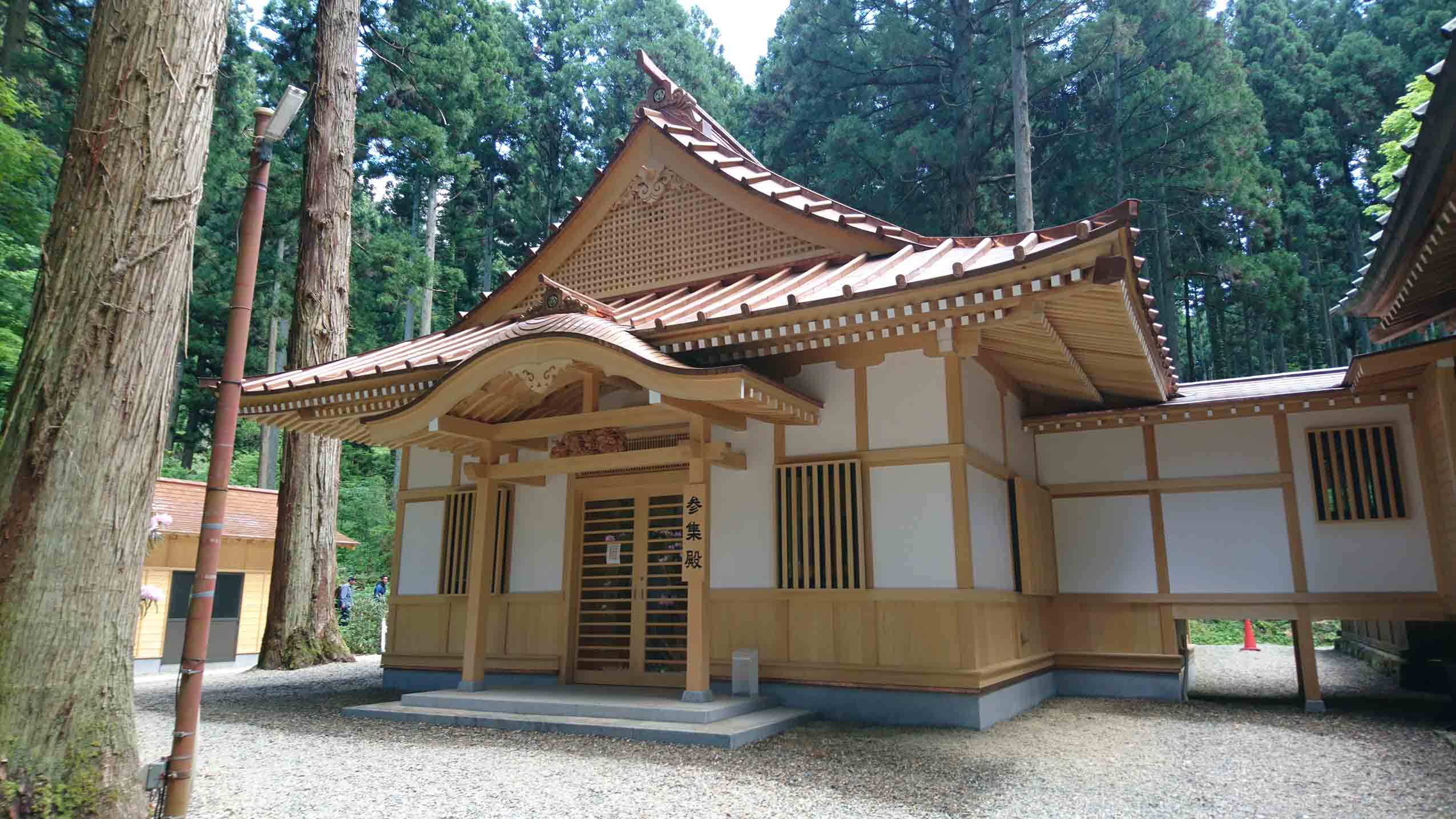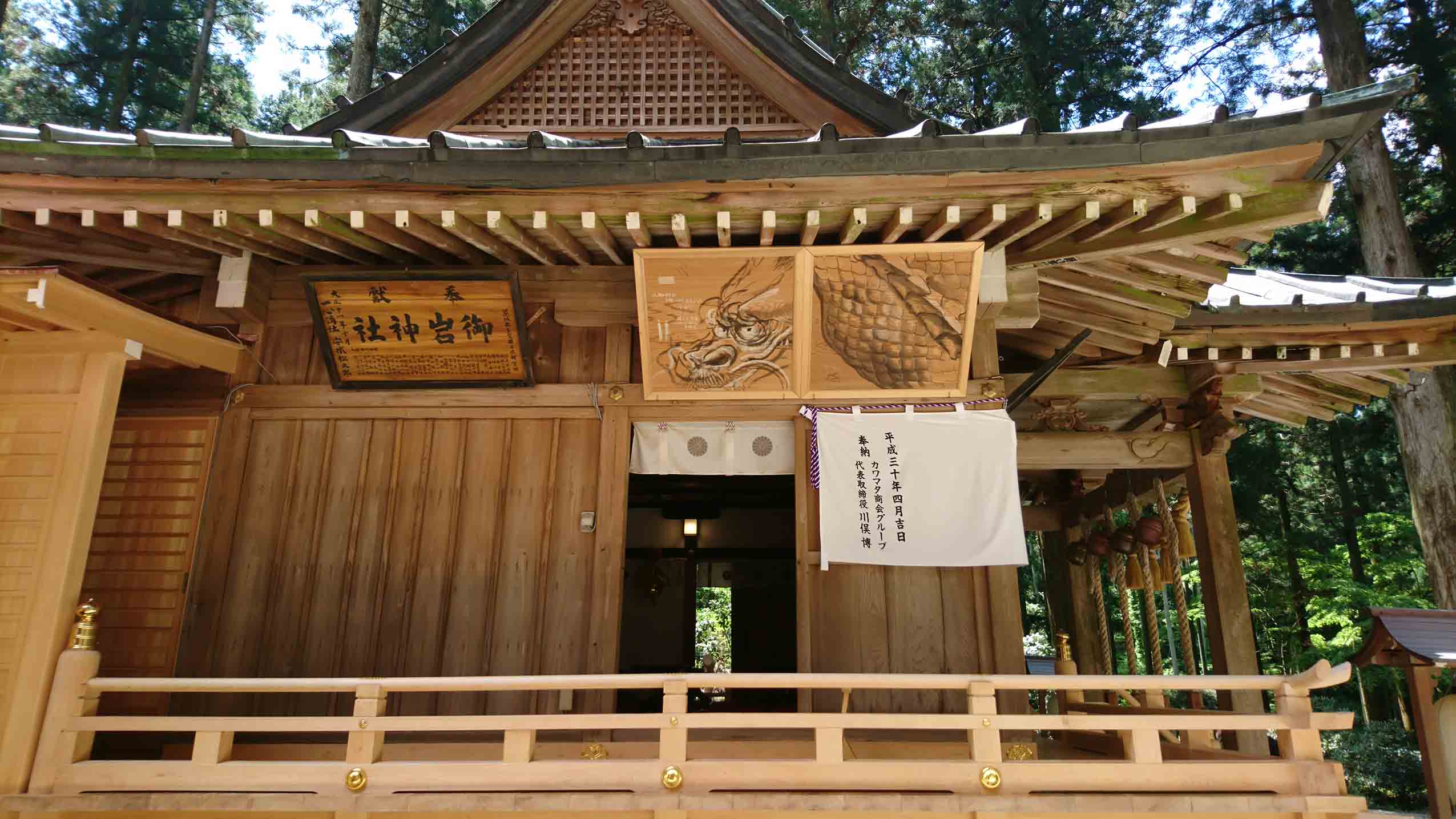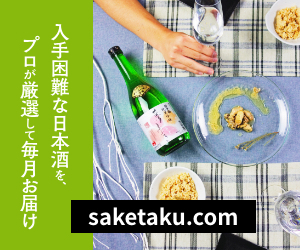- Home
- My Trip Diary
- The ceremony of purification at Oiwa Shrine – Mt. Oiwa, where gods are – Part 4
The ceremony of purification at Oiwa Shrine – Mt. Oiwa, where gods are – Part 4
- 2019/1/28
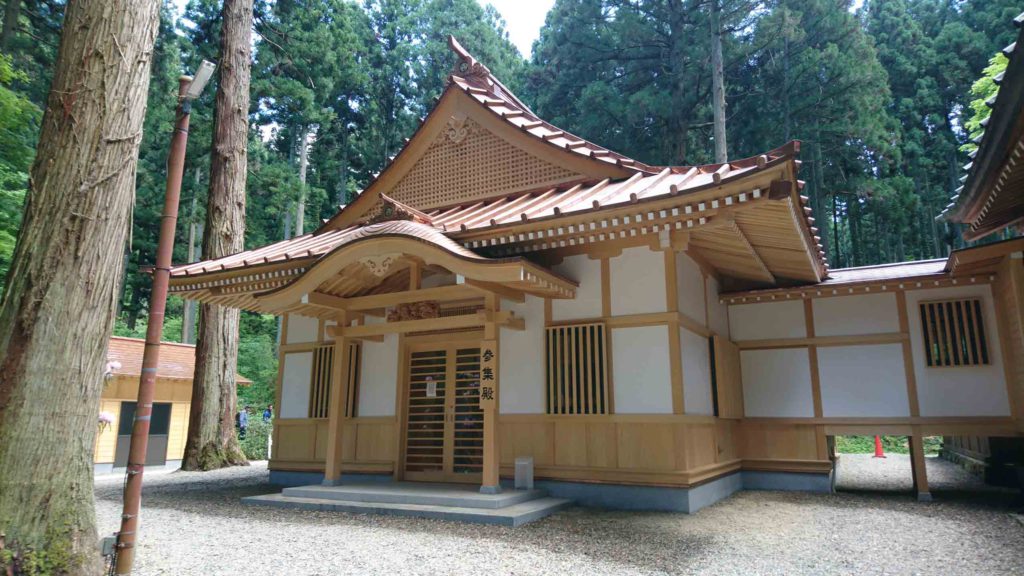
Good evening!
Thank you very much for visiting this blog.
Today’s report is the 4th part of my trip to Oiwa Shrine.
I’d like to write about the purification ceremony at the shrine this time.
Contents
Sanshuden
I arrived at Haiden (building for praying), and I finished the worship as usual.
After that, I went to Sanshuden (building for waiting before ceremony) next to Haiden which I was told to go at the reception office.
The building was under construction when I visited there last time.
I was impressed because it comes that I entered the building.
I opened the door saying “Excuse me…….”. There was a reception desk in front of me, but there were no lights on and no people either.
I looked aside, and found a sign of “Waiting Room”.
I was told to wait at Sanshuden, and it was strange to stand and wait at the entrance, so I took off my shoes to go inside the room.
In the waiting room, there were no other people.
I decided not to care about it, and entered the waiting room.
After a while, someone knocked the door.
The door opened, and Miko (shrine maiden) came inside.
She looked different from Miko who I saw at the shrine office (maybe the Miko at the office was a part time worker).
I thought by intuition that she was genuine.
“Welcome to our shrine. Please excuse my not greeting you at arrival,” she said so.
I noticed that it was me who should’ve not enter the building without asking anyone.
I apologized for my behavior( _ _)
She forgave me with a smile, and told me to wait a little more until 12 o’clock.
She went back to the entrance to welcome other people who came to receive the purification.
I was so surprised and impressed because I didn’t expect that a person who work for a shrine would treat visitors so politely.
Haiden
3 groups came in the waiting room later, and the time became 12.
We were guided to Haiden to receive the prayer.
We went through a connecting corridor from Sanshuden to Haiden, and entered Haiden from the entrance in the photo above.
I have visited many shrines, and it was my second time to enter Haiden (the first time was Izumo Taisha Shrine’s main building which was specially opened in 2008).
There were chairs inside.
I had a seat in the front row.
Like most of other shrines, photography was not allowed during the ceremony.
So, I will explain how it was with words and some simple pictures I made by Illustrator which I started to use recently.
First of all, the inside of Haiden was like Ekoden (please refer to the last blog).
There was an alter (I’m not really sure it was an alter, though) in the middle at the back, and Shinkyo (divine mirror) was placed on it.
Of course, the alter was bigger than that of Ekoden, and the decoration was more gorgeous as well.
Between the seats of the participants and the alter, there were 2 desks, and 4 Tatami (Japanese traditional floor mat) mats like those which the princess and the prince of Hinamatsuri (Girls’ Festival) dolls sit on.
It was like this below;
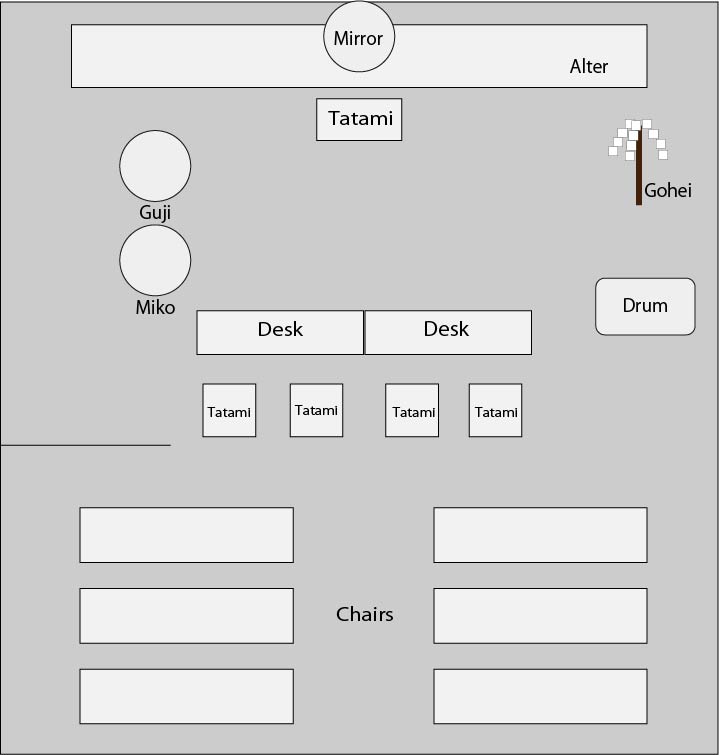
Purification Ceremony
We were guided into Haiden, and we wait for a while.
Then, Guji (the chief priest of shrine) and Miko came in.
Guji made a short speech of greeting first, and he checked the participants’ names.
Guji did a performance of worship, and then beat a drum to tell the start of the ceremony.
There was a baby among us, but he or she didn’t cry at all even when the drum was hit.
I’m sure that he or she will be a strong child^^
After the drum, Guji waved Gohei which is a stick with paper pieces cut into a zigzag shape, which shinto priests often have.
And then, he changed his tool to a stick with many bells, and he expelled our evils.
He sat before the mirror, and read Norito (address to gods).
Norito is the language which gods use, and Guji translate the participants’ wish into Norito to send it to the gods.
If you listen to it carefully, you find many words which you leant in classical Japanese at school.
I hear that some people don’t understand words in Norito at all, but I can understand it as I like classic Japanese and classical Chinese since I was young.
My scores of these two subjects in the entrance exam for university were good, and I read books of these old languages still now.
So I understood the contents of Norito much.
My wish was Josai Shofuku (Avoiding disasters and inviting happiness).
Indeed, Guji was asking the god to remove my bad lucks and give me happiness in old words.
While I was listening to Norito and thinking about the future happiness coming, I caught words to say “open the door of happiness, inviting a good match for marriage…” or something.
Please remember what I mentioned in the before last blog – When I made reservation for the ceremony, I talked about my situation such as having bad lucks and missing to meet a good woman for a long time to a lady over the phone.
I noticed that the lady of the phone should have told Guji my situation and my wish from my soul, and Guji added the words in Norito…!!
I was surprised, and more than that, I was moved a lot by the lady and Guji’s kindness to understood troubles and wishes of a stranger like me. I felt that my heart in the dark got a warm light, and the haze inside me disappeared.
After Norito, we were called to the desks in the middle one by one.
We sat there, and placed Sakaki plant (a type of plant which is used for Shintoism ceremonies) which we received from Miko on the desk to present it to the god.
We did 2 bows – 2 claps – 1 bow, and then submitted our wish to the god.
My wish was “Bad luck goes away, good luck comes in, my business goes well, and an encounter with a good partner comes”.
Was it too much? ^^;
When all of us finished the Sakaki and praying, the Guji hit the drum.
He finished the ceremony with a short speech.
In the ceremony at Arai Daishi, the priest read Buddhist sutra.
Because I didn’t understand it, I just watched the ceremony objectively.
On the other hand, at Oiwa Shrine, I could feel strongly that I was a part of the ceremony because I had my role.
Above all, I was so happy to receive warm service of the people at the shrine.
It was already enough to make me happy.
What harms people’s heart the most is that of people, but I felt that what heals the heart the most is also that of people.
The people who are involved in religions read people’s mind, and they help the people get recovered.
I appreciated their work a lot.
At the very end of the ceremony, Guji said, “Always don’t forget your feeling of appreciation for the gods.”
When things are going well, we often forget the existence of what support us such as gods and people around us.
However, when we have troubles, we suddenly ask them for help.
I think that we get in troubles because we forget about the precious support we receive and become arrogant when the situation is good.
Such disrespect should create bad lucks at the end.
If we don’t forget the feeling of appreciation for what support us, our lives should be better.
“Bad luck” is our heart that cannot recognize it, and the religious ceremonies like I took help us recognize it.
When I noticed such things through this ceremony at Oiwa Shrine, I felt that my haze in my mind disappeared.
もしお気に入りいただけましたら、投げ銭などしていただけると、大変、嬉しいです♪

Restaurant Information
| Shop Name | |
|---|---|
| Prefectures | - |
| Tel | |
| Address | |
| Nearest Station | |
| Homepage | - |
| Business Hours | - |
| Holiday | |
| Introduction | |
| Sake List |
|

